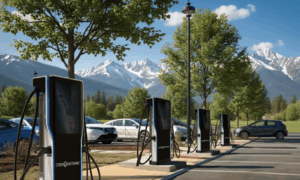
Home / EV Charging News / The Potential of Ultra-Fast Charging Technology: Examining the latest advancements in ultra-fast charging technology and its implications for reducing charging time and enhancing convenience
In an era of rapid technological evolution, the electric vehicle (EV) industry stands at the forefront of sustainable innovation. As the world pivots toward cleaner transportation alternatives, the efficiency and convenience of EV charging become paramount. Ultra-fast charging technology emerges as a game-changer, promising to reshape the charging landscape, accelerate EV adoption, and transform the transportation sector. This article delves into the latest advancements in ultra-fast charging technology and explores the implications of its potential to reduce charging time and enhance convenience for EV users.
Traditional charging methods have long been a point of contention for potential EV adopters due to their time-consuming nature. Ultra-fast charging aims to shatter these barriers by significantly reducing the time required to recharge an EV. Unlike conventional charging, which might take hours to reach a full charge, ultra-fast charging leverages advanced hardware and intelligent algorithms to deliver substantial energy to the battery in a matter of minutes.
Recent innovations in ultra-fast charging technology have centered on pushing the limits of charging speeds and power levels. Industry pioneers are striving to achieve charging speeds of up to 350 kW and beyond. This remarkable progress has the potential to revolutionize the EV experience, transforming charging stops from prolonged waits into brief intervals during longer journeys. The increased power delivery dramatically enhances the practicality of EVs.
While ultra-fast charging holds great promise, it also raises questions about battery compatibility and safety. The rapid energy transfer during ultra-fast charging can generate heat and stress within battery cells. To mitigate these challenges, battery manufacturers are exploring novel solutions, including improved cooling mechanisms and battery chemistries optimized for high-power charging. Ensuring that batteries can handle ultra-fast charging safely and efficiently is crucial for the technology’s long-term viability.
The success of ultra-fast charging technology hinges not only on advancements within EVs themselves but also on the creation of a robust charging infrastructure. The promising news is that efforts are already underway globally to establish widespread charging networks that can accommodate ultra-fast charging, bringing convenience to EV users and bolstering adoption rates.
Ultra-fast charging holds the potential to revolutionize long-distance travel for EV owners. With ultra-fast charging technology, the concept of “range anxiety” becomes less relevant. EV drivers can recharge their vehicles quickly and conveniently at strategically located charging stations along major routes, facilitating seamless travel and enhancing the appeal of electric mobility.
As ultra-fast charging gains traction, it’s essential to consider its environmental impact and the increased demand for energy. The rapid energy transfer required during ultra-fast charging can strain local power grids, particularly if multiple EVs are charging simultaneously. Addressing this challenge requires advancements in renewable energy sources, energy storage systems, and demand-response mechanisms to ensure that ultra-fast charging growth aligns with sustainability goals and minimizes its ecological footprint.
As ultra-fast charging technology evolves, the importance of standardized charging protocols becomes evident. A universal approach to charging standards would ensure interoperability among various EV models and charging networks, eliminating confusion and inconvenience for users. International organizations and regulatory bodies are actively working to establish common standards, streamlining the integration of ultra-fast charging solutions into diverse EV ecosystems.
Governments, private companies, research institutions, and consumers all play pivotal roles in shaping the trajectory of this transformation. Governments can incentivize the development of charging infrastructure and offer policy support to accelerate adoption. Private companies, from automakers to energy providers, can invest in research and development, pushing the boundaries of what’s technologically feasible. Research institutions can contribute by advancing battery technology, charging algorithms, and safety measures.
One significant hurdle is the potential strain on local electricity grids, especially during peak charging periods. A comprehensive approach that incorporates smart grid solutions, battery energy storage, and efficient load management will be crucial to avoid overburdening power infrastructure.
Safety is another critical aspect that demands rigorous attention. Ultra-fast charging systems must be designed with fail-safes and redundancies. Battery manufacturers need to continue refining their chemistries and designs to withstand the rigors of high-power charging without compromising safety or longevity.
As we look ahead, the integration of ultra-fast charging technology is poised to redefine urban landscapes, highways, and transportation norms. Charging stations could transform into vibrant hubs offering not only rapid energy replenishment but also various amenities and services to enhance the charging experience. Moreover, the collective impact of ultra-fast charging on reducing greenhouse gas emissions, air pollution, and dependence on fossil fuels cannot be understated. It aligns with the global pursuit of a more sustainable future and a healthier planet for future generations.
In conclusion, the rapid evolution of ultra-fast charging technology signifies a turning point in the electric vehicle industry. With the potential to drastically reduce charging times, enhance convenience, and reshape long-distance travel, ultra-fast charging holds the key to accelerating the global transition to sustainable transportation. As battery technology, charging infrastructure, and safety measures continue to advance, the vision of an electrified world with fast, accessible, and eco-friendly transportation is becoming increasingly attainable. The journey towards a greener future is not a solo endeavor but a collaborative expedition where governments, industries, and individuals come together to embrace the potential of ultra-fast charging technology. Through this joint effort, we can usher in a new era of mobility, where the power of choice meets the promise of sustainability.



